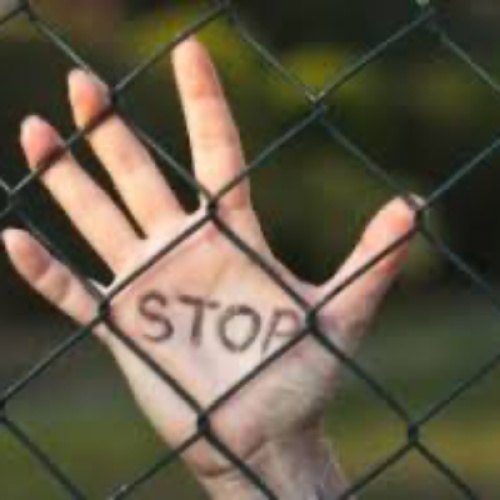A Mother's Fight
In a humble neighborhood of Los Angeles, Maria Vargas woke up before the sun had fully risen. As the aroma of coffee filled the small kitchen, she felt the weight of an anxious heart. The news had been disturbing: reports of families being torn apart in the middle of the night, innocent lives shattered during mass deportation. Maria, a mother of three, had lived in the United States for over a decade after fleeing violence in her hometown in Mexico. The thought of her children being taken away frightened her more than anything else.
As she prepared breakfast, her eldest son, Carlos, walked in with tousled hair and sleepy eyes. "Mom, are we safe?" he asked cautiously, a whisper of fear in his voice.
Maria knelt down to meet Carlo's gaze. "We are together, mi hijo, and together we are strong. I promise I will do everything I can to keep you safe." She could see the doubt in his eyes, but she smiled, hoping to reassure him.
Later that day, Maria attended a community meeting at the local church. It was packed with families, each one affected by the looming threat. The priest talked passionately about unity and courage, reminding everyone that they were not alone. Afterward, Maria spoke up, her voice shaking but firm. "We need to stand together. We must fight for our rights and for our families."
As the weeks went by, Maria became a leader in her community.
She organized rallies, spoke to local journalists, and reached out to lawyers who could help those at risk of deportation. Her determination lit a fire among her neighbors; together, they were creating a powerful voice against the injustices they faced.
Despite her efforts, the reality hit hard when friends and fellow families began to disappear. Each time Maria heard the news of another deportation, she felt her heart crumble a little more. She spent her nights forming plans, praying for guidance, and hoping for change.
One evening, Maria received a call from an attorney, Laura, who had been fighting for immigrant rights. "Maria, I think we can begin a legal challenge against the deportations in our area. We need as many affected families as possible to join us. Are you in?"
Without a moment's hesitation, Maria agreed. She gathered her family and spoke to her children about the importance of the fight. "We need to show them that we belong here. We need to stand up for our rights, not just for us but for everyone."
As the day of the court hearing approached, Maria and Laura worked tirelessly. Maria spent hours gathering testimonies from affected families, creating a case that showcased their contributions to the community and the dangers they faced if returned to Mexico.
The day of the hearing was bittersweet. Maria sat anxiously in the courtroom, flanked by her children and neighbors. The
tension was palpable as the judge listened to both sides. Once the arguments were presented, the courtroom fell into an eerie silence. After what felt like an eternity, the judge spoke, ruling in favor of the community. Maria's heart swelled with hope; this was a victory, but the fight was far from over.
As news spread of the ruling, Maria and her neighbors celebrated. They organized a community day to express gratitude and continued support for one another. Yet, deep down, Maria knew the battle against injustice would persist. In the following weeks, more families joined their group, each wanting to share their stories and fight together.
With each passing month, Maria's advocacy grew. She learned about her rights and those of her community, and she started to educate others. She found strength in motherhood and the love she held for her children. Maria made it her mission to ensure that every family felt safe, valued, and protected.
Finally, after years of unmatched turmoil, the government announced a program allowing long-term residents a path to permanent residency. When the news reached Maria, she couldn't believe her ears. Hope flooded her heart as she shared the news with her children, who jumped up and down with joy.
Maria knew that the fight was not over completely, but those moments of triumph fueled her passion. The community was stronger than ever, bonded by shared struggles and victories. Whenever challenges arose, they remembered the power of their voices and the love that united them, ensuring that future
generations would not have to fight the same fight.
And so, with her family beside her and her community rallied together, Maria continued her fight for justice, proving that the heart of a mother would go to any lengths to protect her family.
In a humble neighborhood of Los Angeles, Maria Vargas woke up before the sun had fully risen. As the aroma of coffee filled the small kitchen, she felt the weight of an anxious heart. The news had been disturbing: reports of families being torn apart in the middle of the night, innocent lives shattered during mass deportation. Maria, a mother of three, had lived in the United States for over a decade after fleeing violence in her hometown in Mexico. The thought of her children being taken away frightened her more than anything else.
As she prepared breakfast, her eldest son, Carlos, walked in with tousled hair and sleepy eyes. "Mom, are we safe?" he asked cautiously, a whisper of fear in his voice.
Maria knelt down to meet Carlo's gaze. "We are together, mi hijo, and together we are strong. I promise I will do everything I can to keep you safe." She could see the doubt in his eyes, but she smiled, hoping to reassure him.
Later that day, Maria attended a community meeting at the local church. It was packed with families, each one affected by the looming threat. The priest talked passionately about unity and courage, reminding everyone that they were not alone. Afterward, Maria spoke up, her voice shaking but firm. "We need to stand together. We must fight for our rights and for our families."
As the weeks went by, Maria became a leader in her community.
She organized rallies, spoke to local journalists, and reached out to lawyers who could help those at risk of deportation. Her determination lit a fire among her neighbors; together, they were creating a powerful voice against the injustices they faced.
Despite her efforts, the reality hit hard when friends and fellow families began to disappear. Each time Maria heard the news of another deportation, she felt her heart crumble a little more. She spent her nights forming plans, praying for guidance, and hoping for change.
One evening, Maria received a call from an attorney, Laura, who had been fighting for immigrant rights. "Maria, I think we can begin a legal challenge against the deportations in our area. We need as many affected families as possible to join us. Are you in?"
Without a moment's hesitation, Maria agreed. She gathered her family and spoke to her children about the importance of the fight. "We need to show them that we belong here. We need to stand up for our rights, not just for us but for everyone."
As the day of the court hearing approached, Maria and Laura worked tirelessly. Maria spent hours gathering testimonies from affected families, creating a case that showcased their contributions to the community and the dangers they faced if returned to Mexico.
The day of the hearing was bittersweet. Maria sat anxiously in the courtroom, flanked by her children and neighbors. The
tension was palpable as the judge listened to both sides. Once the arguments were presented, the courtroom fell into an eerie silence. After what felt like an eternity, the judge spoke, ruling in favor of the community. Maria's heart swelled with hope; this was a victory, but the fight was far from over.
As news spread of the ruling, Maria and her neighbors celebrated. They organized a community day to express gratitude and continued support for one another. Yet, deep down, Maria knew the battle against injustice would persist. In the following weeks, more families joined their group, each wanting to share their stories and fight together.
With each passing month, Maria's advocacy grew. She learned about her rights and those of her community, and she started to educate others. She found strength in motherhood and the love she held for her children. Maria made it her mission to ensure that every family felt safe, valued, and protected.
Finally, after years of unmatched turmoil, the government announced a program allowing long-term residents a path to permanent residency. When the news reached Maria, she couldn't believe her ears. Hope flooded her heart as she shared the news with her children, who jumped up and down with joy.
Maria knew that the fight was not over completely, but those moments of triumph fueled her passion. The community was stronger than ever, bonded by shared struggles and victories. Whenever challenges arose, they remembered the power of their voices and the love that united them, ensuring that future
generations would not have to fight the same fight.
And so, with her family beside her and her community rallied together, Maria continued her fight for justice, proving that the heart of a mother would go to any lengths to protect her family.







